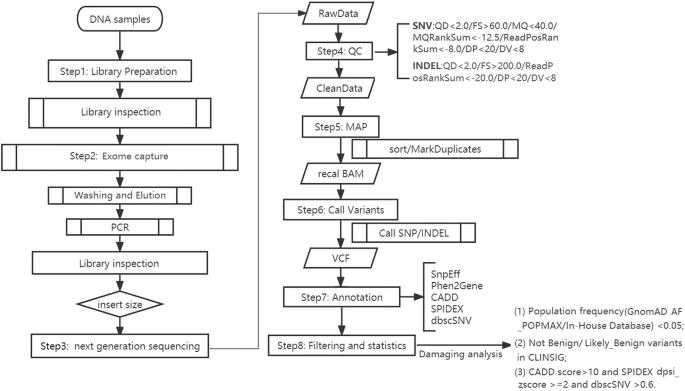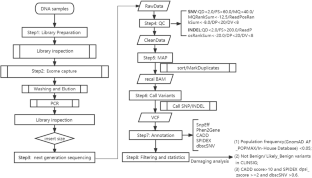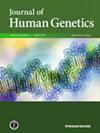建议对成人遗传疾病患者中意义不明的变异体 (VUS) 进行重新分类。
IF 2.6
3区 生物学
Q2 GENETICS & HEREDITY
引用次数: 0
摘要
由于基因检测中报告的意义不确定变异(VUS)不能用于临床,这种分类可能会延误或禁止对成人遗传疾病患者进行精确诊断和遗传咨询。对用于 VUS 的不同定性证据进行大规模分析,可以更准确地对其进行重新分类。我们分析了 458 例中国成人患者的 WES 数据,在 15 个致病证据中,PS1、PS2、PM1、PM6 和 PP4 没有被用于 VUS 致病性分类,而 PP3、BP4、PP2 的使用频率更高。在所有报告的变异中,PM2_Supporting 的使用最为广泛。此外,还有31个可能是患者致病变异的空变异(无意义、框移、规范±1或2个剪接位点)被归类为VUS。通过对所有 VUS 所使用的证据进行分析,我们建议急需提供适当的遗传咨询、可靠的内部数据发布、病例与对照之间的等位基因频率比较、扩大患者家族的验证范围、共分离分析和功能测定,以收集更多证据对 VUS 进行重新分类。我们还发现,患有神经系统疾病的成人患者报告的与表型相关的 VUS 最多,而且表型特异性越低,报告的 VUS 就越多。这一结果强调了检测前遗传咨询的重要性,它将减少 VUS 的报告。我们的研究结果首次揭示了成人遗传性疾病患者 VUS 的致病性分类证据的特点,推荐了一种基于规则的 VUS 致病性评估流程,为准确评估 VUS 的致病性和临床分级信息提供了有力依据。同时,进一步扩大了成人遗传病的遗传谱,提高了成人遗传病的诊断率。本文章由计算机程序翻译,如有差异,请以英文原文为准。


The recommendation of re-classification of variants of uncertain significance (VUS) in adult genetic disorders patients
Since variants of uncertain significance (VUS) reported in genetic testing cannot be acted upon clinically, this classification may delay or prohibit precise diagnosis and genetic counseling in adult genetic disorders patients. Large-scale analyses about qualitatively distinct lines of evidence used for VUS can make them re-classification more accurately. We analyzed 458 Chinese adult patients WES data, within 15 pathogenic evidence PS1, PS2, PM1, PM6 and PP4 were not used for VUS pathogenic classification, meanwhile the PP3, BP4, PP2 were used much more frequently. The PM2_Supporting was used most widely for all reported variants. There were also 31 null variants (nonsense, frameshift, canonical ±1 or 2 splice sites) which were probably the disease-causing variants of the patients were classified as VUS. By analyzed the evidence used for all VUS we recommend that appropriate genetic counseling, reliable releasing of in-house data, allele frequency comparison between case and control, expanded verification in patient family, co-segregation analysis and functional assays were urgent need to gather more evidence to reclassify VUS. We also found adult patients with nervous system disease were reported the most phenotype-associated VUS and the lower the phenotypic specificity, the more reported VUS. This result emphasized the importance of pretest genetic counseling which would make less reporting of VUS. Our result revealed the characteristics of the pathogenic classification evidence used for VUS in adult genetic disorders patients for the first time, recommend a rules-based process to evaluate the pathogenicity of VUS which could provide a strong basis for accurately evaluating the pathogenicity and clinical grade information of VUS. Meanwhile, we further expanded the genetic spectrum and improve the diagnostic rate of adult genetic disorders.
求助全文
通过发布文献求助,成功后即可免费获取论文全文。
去求助
来源期刊

Journal of Human Genetics
生物-遗传学
CiteScore
7.20
自引率
0.00%
发文量
101
审稿时长
4-8 weeks
期刊介绍:
The Journal of Human Genetics is an international journal publishing articles on human genetics, including medical genetics and human genome analysis. It covers all aspects of human genetics, including molecular genetics, clinical genetics, behavioral genetics, immunogenetics, pharmacogenomics, population genetics, functional genomics, epigenetics, genetic counseling and gene therapy.
Articles on the following areas are especially welcome: genetic factors of monogenic and complex disorders, genome-wide association studies, genetic epidemiology, cancer genetics, personal genomics, genotype-phenotype relationships and genome diversity.
 求助内容:
求助内容: 应助结果提醒方式:
应助结果提醒方式:


